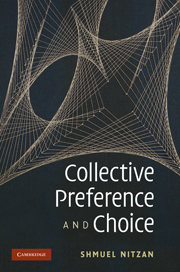Book contents
- Frontmatter
- Contents
- List of figures
- Preface
- Acknowledgments
- Part I Introduction
- Part II Different Preferences
- 4 Do social preferences exist? Arrow's and Sen's impossibility theorems
- 5 The desirable decision rule: axiomatization
- 6 Rule selection based on compromise with the unanimity criterion
- 7 Paradoxes of voting
- 8 Majority tyranny
- 9 The problem of inefficient provision of public goods
- 10 Do individuals reveal their true preferences?
- Part III Identical Preferences, Different Decisional Skills
- Bibliography
- Author index
- Subject index
7 - Paradoxes of voting
Published online by Cambridge University Press: 05 June 2012
- Frontmatter
- Contents
- List of figures
- Preface
- Acknowledgments
- Part I Introduction
- Part II Different Preferences
- 4 Do social preferences exist? Arrow's and Sen's impossibility theorems
- 5 The desirable decision rule: axiomatization
- 6 Rule selection based on compromise with the unanimity criterion
- 7 Paradoxes of voting
- 8 Majority tyranny
- 9 The problem of inefficient provision of public goods
- 10 Do individuals reveal their true preferences?
- Part III Identical Preferences, Different Decisional Skills
- Bibliography
- Author index
- Subject index
Summary
Arrow's impossibility theorem implies that there is no way to transform the individuals' preference profile to a “reasonable,” non-dictatorial social preference relation that ensures the existence of a well-defined, consistent social choice that is essentially similar to the rational choice of every individual in society. The theorem therefore raises doubts regarding the meaning and applicability of notions such as the “public interest,” “national objective,” “representative individual” or “reasonable man.” Since there is no reasonable, non-dictatorial social preference relation that ensures the existence of a well-defined social choice rule, one may expect that the use of different collective choice rules is associated with “paradoxes,” that is, with the violation of some plausible properties. This chapter is devoted to the illustration of several such paradoxes. As already noted, different individuals are usually interested in different choice rules. Consequently, a democratic system faces the basic difficulty of securing agreement on the voting rule it applies. The examples presented below point then to another difficulty; the choice rules used by political-economic systems may be deficient in the sense that under certain circumstances they result in paradoxical outcomes.
The various paradoxes will be illustrated assuming that the aggregation rule is the simple majority rule, or that the social choice rule is the plurality rule, the plurality runoff, the sequential majority rule or the Borda rule.
- Type
- Chapter
- Information
- Collective Preference and Choice , pp. 93 - 116Publisher: Cambridge University PressPrint publication year: 2009



